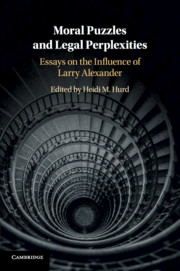Book contents
- Moral Puzzles and Legal Perplexities
- Moral Puzzles and Legal Perplexities
- Copyright page
- Dedication
- Contents
- Figures
- Contributors
- Acknowledgments
- 1 Introduction
- Part I Puzzles in Criminal Law
- Part II Problems in Constitutional Law
- Part III Perplexities in Jurisprudence
- 14 For Legal Principles
- 15 The Court, or the Constitution?
- 16 Alexander as Anarchist
- 17 Exclusionary Rules
- 18 Larry Alexander and “the Gap”
- Part IV Paradoxes in Moral Philosophy
- Bibliography of Works by Larry Alexander
- Index
14 - For Legal Principles
from Part III - Perplexities in Jurisprudence
Published online by Cambridge University Press: 02 November 2018
- Moral Puzzles and Legal Perplexities
- Moral Puzzles and Legal Perplexities
- Copyright page
- Dedication
- Contents
- Figures
- Contributors
- Acknowledgments
- 1 Introduction
- Part I Puzzles in Criminal Law
- Part II Problems in Constitutional Law
- Part III Perplexities in Jurisprudence
- 14 For Legal Principles
- 15 The Court, or the Constitution?
- 16 Alexander as Anarchist
- 17 Exclusionary Rules
- 18 Larry Alexander and “the Gap”
- Part IV Paradoxes in Moral Philosophy
- Bibliography of Works by Larry Alexander
- Index
Summary
- Type
- Chapter
- Information
- Moral Puzzles and Legal PerplexitiesEssays on the Influence of Larry Alexander, pp. 241 - 259Publisher: Cambridge University PressPrint publication year: 2018
- 1
- Cited by



